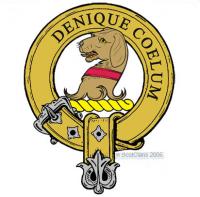
Clan Melville
Clan Melville People
Andrew Melville (1545 – 1622)
Scottish scholar, theologian and religious reformer.
Andrew Melville was born at Baldovy near Montrose, Angus, the youngest son of Richard Melville, his father died at the Battle of Pinkie in 1547.
Melville was educated in Montrose, then going to the University of St Andrews where he showed great promise. On completing his course, Melville left St Andrews with the reputation of "the best poet, philosopher, and Grecian of any young master in the land."In 1564, he set out for France to complete his education at the University of Paris. He then went on to study civil law, and though only twenty-one was apparently at once made a regent in the college of St Marceon.
While he lived at Geneva the massacre of St Bartholomew in 1572 drove immense numbers of Protestant refugees to that city, including several of the most distinguished French men of letters of the time. Among these were several men learned in civil law, and political science, and associating with them increased Melville's knowledge and enlarged his ideas of civil and ecclesiastical liberty. In 1574 Melville returned to Scotland, and almost immediately received the appointment of Principal of the University of Glasgow, and began its renewal.
He was Moderator of the General Assembly in 1582, and took part in the organization of the Church and the Presbyterian method. Troubles arose from the attempts of the court to force a system of episcopacy upon the Church of Scotland, and Melville prosecuted one of the Tulchan Bishops (Robert Montgomery, d. 1609). For this he was summoned before the Privy Council in February 1584, and had to flee into England in order to escape a charge of treason.
After twenty months he returned to Scotland and resumed his lectures in St Andrews, where he continued for twenty years; he became Rector of the University in 1590. He frequently clashed with King James of Eclesiatical matters and this resulted in him spending 4 years in the Tower of London. On being freed, but refused permission to return to his own country, he was invited to fill a professor's chair in the University of Sedan, and there he spent the last eleven years of his life.
George Melville, 1st Earl of Melville (1636 – 1707)
Scots aristocrat and statesman during the reigns of William and Mary. Melville was a moderate Whig and Presbyterian.
In 1683 Melville and his son David Leslie-Melville, the Earl of Leven, were accused of complicity in the Rye House Plot — a Whig conspiracy to assassinate King Charles II and his brother the Duke of York (the future James VII).
After the revolution of 1688 Melville played a prominent part in Scots and English politics, most notably in the Convention Parliament which offered the crown of Scotland to William of Orange and his wife, Mary, daughter of the deposed James VII. In 1689 William made him sole Secretary of State for Scotland and in 1690 he was created Earl of Melville, Viscount Kirkaldie, and Lord Raith, Monymaill and Balewarie (all in the Peerage of Scotland).
David Leslie-Melville, 3rd Earl of Leven (1660 – 1728)
Scots aristocrat, politician, and soldier.
The third son of George Melville, 1st Earl of Melville and his second wife Catherine Leslie-Melville, he shared the Whig political and the Presbyterian religious sympathies of his father. In 1681, with the death of John Leslie, 1st Duke of Rothes, he was permitted to enter into the Earldom of Leven.
In 1683 Leven and his father were suspected of complicity in the Rye House Plot, a Whig conspiracy to assassinate Charles II and his brother James, Duke of York. To escape arrest they fled to the Netherlands where they joined the band of British Protestant exiles at the court of Prince William of Orange.
He was used by William to obtain the support of German princes for his invasion of England in 1688. In 1706 he was appointed as one of the Commissioners for the Union of England and Scotland.
He succeeded his father as Earl of Melville in 1707.
Arthur Melville (1858-1904)
Scottish painter, now probably best remembered for his Orientalist subjects.
Melville was born in Scotland, near Haddington. He took up painting while working as a grocer's apprentice, then attended the Royal Scottish Academy Schools and studied afterwards in Paris and Greece. The remarkable colour-sense which is so notable a feature of his work, whether in oils or in watercolour, came to him during his adventurous travels in Persia, Egypt and Turkey from 1880-82.
Melville, though comparatively little known during his lifetime, was one of the most powerful influences in the contemporary art of his day, such as the Glasgow Boys. The Victoria and Albert Museum has one of his watercolours, The Little Bull-Fight Bravo, Toro! and others, like An Oriental Goatherd in the Weimar Museum, are in many museums, especially in Scotland. But many of his pictures remain with private collectors.







